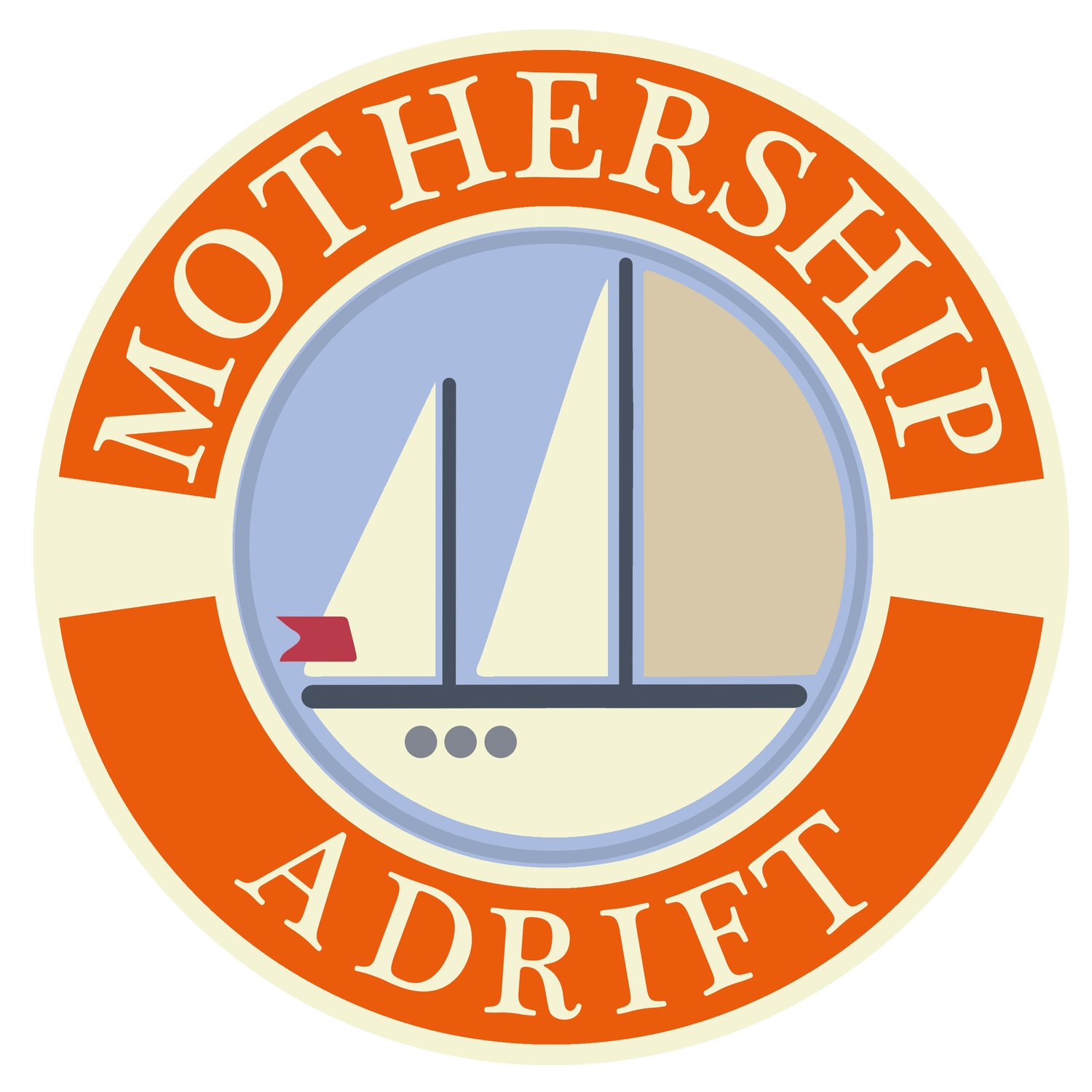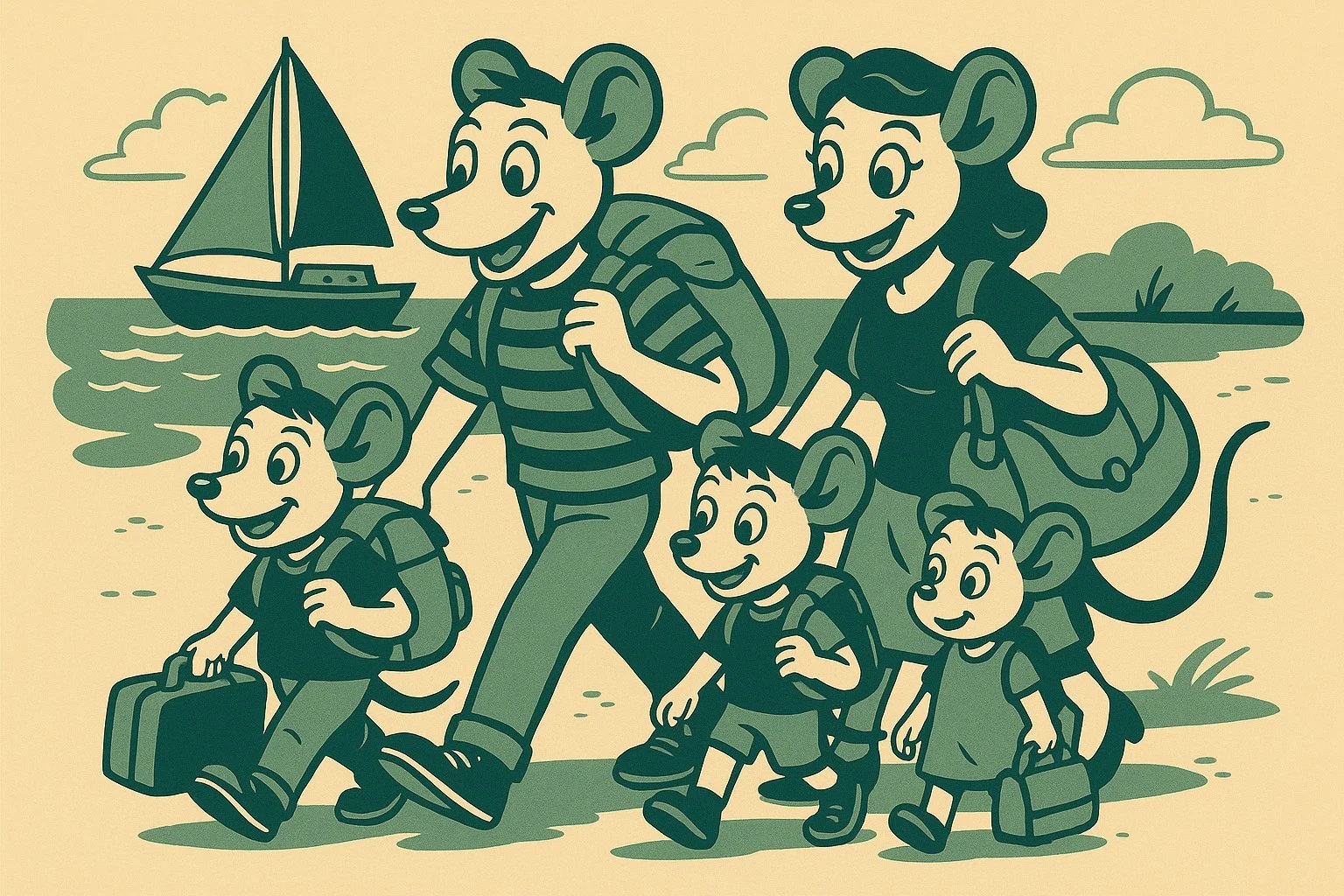Adventure Fatigue: Escape Burnout
01-05-05
“The real voyage of discovery consists not in seeking new landscapes, but in having new eyes”
As bizarre as it might seem to freedom lovers, adventure fatigue and escape burnout can happen
The Irony of Escape
Somewhere in the Pacific, I found myself listening to audiobooks on “how to escape the system” while quite literally halfway across the world’s biggest ocean. The irony wasn’t lost on me.
I wasn’t looking for productivity hacks or passive income schemes. I was looking for reassurance and resonance. Proof that this long, meandering, occasionally leaking experiment in freedom wasn’t just a nautical midlife crisis. I wanted meaning. A philosophy, a framework, a reason for this madness to make sense. Sleep deprivation does that to you!
So during night watches and maintenance marathons, I binged The 4-Hour Workweek by Tim Ferriss, Buy Back Your Time by Dan Martell, The Art of Non-Conformity by Chris Guillebeau, and Company of One by Paul Jarvis, among so many others. Part validation, part survival, and perhaps, if I’m honest, part desperate attempt to convince myself that I hadn’t gone completely mad. Even freedom needs a good pep talk sometimes!
I binged on audio books and podcasts in a desperate attempt to stay awake and convince myself that I hadn’t gone completely mad.
Audible Caffeine
But those were just the gateway drug. Before long, I’d drifted into the high-octane world of Alex Hormozi, Russell Brunson, Robert Kiyosaki and, God help me, even Tony Robbins and Grant Cardone.
It was ludicrous. There I was, salt-streaked and half-delirious at the helm, with the Milky Way blazing above and a thousand fathoms stretching below, while Grant Cardone screamed in my ear about “10Xing” my income, and “crushing targets.” I didn’t even have an income, let alone a target. Yet there I was, fist pumping the stars like some deranged sea monk shouting “Let’s crush it!” into the void.
The irony was glaring: I was out there living the freedom these books were selling, while they could just as easily have been listening to me on a podcast about how to really “escape”, while wedged in rush-hour traffic.
Salt-streaked and half-delirious Grant Cardone screamed in my ear about “10Xing” my income, and “crushing targets.
When the Extraordinary Becomes Ordinary
That’s when it hit me. I didn’t want to escape anything anymore. I missed the grind. The dirty, relentless, predictable struggle of it. After years at sea, adventure had become somewhat routine.
The sunsets blurred, the turquoise bays merged into one long postcard, and I found myself wondering, not in awe, but confusion, whether it was Tuesday, Friday, or possibly 2031.
You drop anchor in yet another bay that would make a travel influencer weep, and instead of gratitude, you feel a creeping sense of déjà vu. That’s adventure fatigue: when freedom starts tasting like reheated leftovers of a once-great meal.
Most long-term cruisers get there eventually. It’s not failure; it’s just that constant motion wears you down molecule by molecule. The extraordinary becomes ordinary, and even paradise gets mundane.
When you’ve escaped the system and start wondering how to monetise it, that’s probably your cue to start stretching your legs ashore for a while.
You drop anchor in yet another bay that would make a travel influencer weep, and instead of gratitude, you feel a creeping sense of déjà vu
The Final Stretch
The final leg of our journey really did us in. After hammering through Asia, the Indian Ocean, and the Red Sea to close the loop, we were cooked. Mentally, financially, and emotionally.
The boat had become a floating to-do list. The adventure, a checklist.
The kids felt it too. Our daughter had already flown home, and the boys wanted a shot at “normal life.” Fair enough. They’d spent more of their childhood afloat than ashore.
As for me, I’ve already mentions in a previous section that I just wanted a day when nothing broke. After eight years of fixing leaks, pumps, cracks, and smells, the sea’s gentle whisper had turned into something more akin to nagging.
After eight years of fixing leaks, pumps, cracks, and smells, I just wanted a day when nothing broke!
Knowing When to Step Off
Some of the happiest ex-cruisers we’ve met are the ones who recognised the difference between perseverance and punishment, before their boat became a prison. They didn’t cling on until resentment soured everything. They left with gratitude, not bitterness, and crucially, still with a deep love for the sea.
If you’ve crossed oceans, raised kids afloat, and fixed engines mid-swell, you’ve already done what most people only dream of. You don’t owe anyone an explanation or the any dream your unrelenting commitment.
Some of the happiest ex-cruisers we’ve met left with gratitude, not bitterness, and crucially, still with a deep love for the sea.
Some of the happiest ex-cruisers we’ve met left with gratitude, not bitterness, and crucially, still with a deep love for the sea.
Maybe the next chapter of your life isn’t meant to be written under sail. Maybe it involves a new boat, a campervan, a patch of dirt to grow veg, built a house, a business, or just find a bit of peace. It doesn’t matter. You’ve already proved your courage. The next voyage is reinvention, not repetition.
So when the sunsets start repeating themselves, don’t fight it. The sea was never meant to hold you forever, if anything it teaches you how to recalibrate and adapt.
Some mistake marinas and harbours for failure. They aren’t. Sometimes they’re simply where you rest, take stock, and decide whether to go again. Maybe you will. Maybe you won’t. Either way, the sea will still be there, as it always has been and always will be. Noble, patient, timeless and indifferent.
The Harbour at Last
Coming ashore after years afloat is an oddly disorienting kind of peace. The land doesn’t move, and that feels suspicious. For weeks, you still reach for handholds that aren’t there. Then, one day, you stop bracing and realise you’re home. Even if you’re not entirely sure where that is anymore.
The sea will still be there, but coming ashore after years afloat is an oddly disorienting kind of peace.
During those long night watches, I also discovered Paul Millerd’s The Pathless Path. It gave shape to what I’d been circling for years, that freedom isn’t about rejecting the system but redefining what “enough” looks like once you’ve left it.
Around the same time, Oliver Burkeman’s Four Thousand Weeks appeared on my radar, calling this thing the “paradox of efficiency”. The harder you chase control, the less life you actually touch. Out there on the ocean, I wasn’t short on time, but I was probably running low on presence and self-awareness.
It reminded me, too, of Captain Fantastic, that brilliant, oddball film about a family living off-grid until they realise total freedom is just another kind of prison. Spoiler alert, in the end, they find balance. Not rebellion, not surrender, just something human in between.
As the film reminds us, the secret is living that freedom without becoming captive to it. Folding those lessons back into real life, not running from it. It really is worth a watch if you’ve never seen it.
Later, Joshua Becker’s The More of Less gave that realisation language. Simplicity, he said, isn’t about self-denial but self-direction. The sea had already stripped us down to essentials, but the real test was now learning how to retain that simplicity on land.
Still find myself looking for meaning in someone else’s chapters during long night watches.
Shelf-Help
And so, as you can see, I still find myself looking for meaning in someone else’s chapters. Another voice, another book, another podcast telling me what I already know, just in a slightly different accent.
Maybe I’ve traded self-help for the shelf-help. Old habits die hard, especially when they come with an Audible subscription!
Perhaps that’s the real paradox: you spend years escaping systems only to find comfort in whoever wrote the latest bestseller on how to “live intentionally.” Maybe that’s just what we do, forever replacing maps with manuals, oceans with algorithms, and call it wisdom.
We’re already lucky enough to live in a world absurdly rich with choice. Freedom and adventure aren’t about perpetual motion or how far you can go; they’re about recognising what’s already within reach. That you don’t need to cross an ocean to find them. Sometimes, you just have to stop long enough to see that the life you’re already living is it, to be utterly grateful for that fact and simply, live it.
If you want more straight-talking tales from life afloat, and information about how adventure fatigue and escape burnout can lead to the end of the cruising dream, then you’ll love our upcoming book. We're inviting early readers to join the pre-launch crew and get behind-the-scenes access as we wrestle it into shape. It’s honest, unfiltered, and occasionally useful. Sign up here to get involved, give feedback, and be part of something that’ll either be a bestseller or a brilliant cautionary tale.









